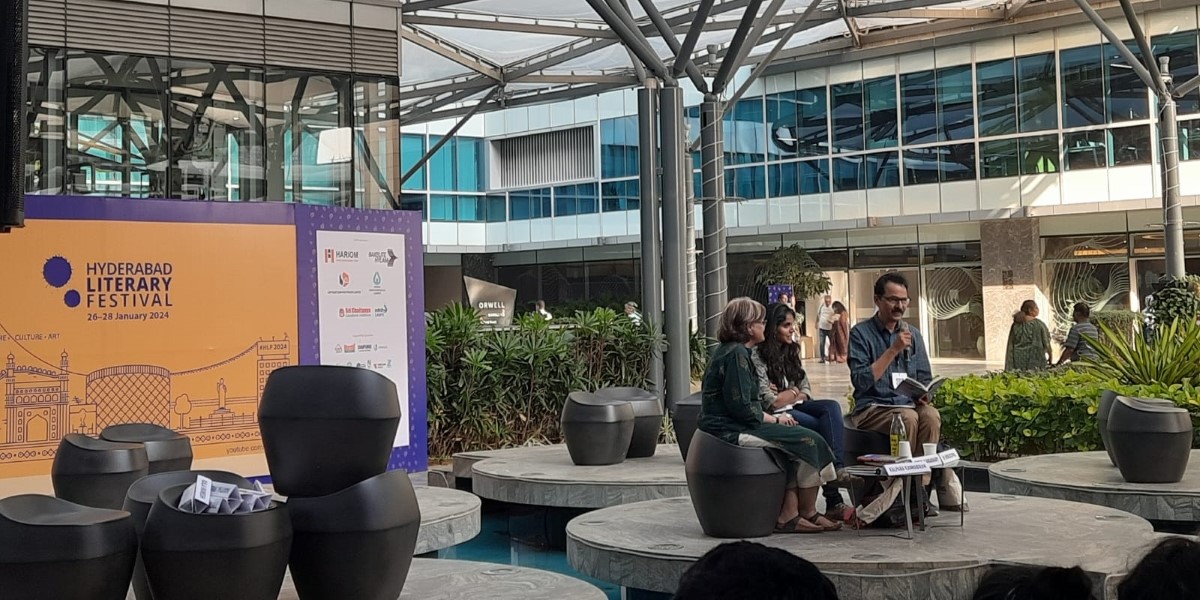Poets N Venugopal and Meena Kandasamy discussed and read from their new volume celebrating the life and work of Varavara Rao.

Kalpana Kannabiran, Meena Kadaswamy and N Venugopal at the HLF.
During the last session of Kaavya Dhaara — a session dedicated to poetry at the Hyderabad Literary Festival 2024, journalist, poet, and writer N Venugopal and writer, poet and translator Meena Kandasamy discussed their new volume celebrating the life and work of revolutionary writer Varavara Rao.
The book — a collection of Varavara Rao’s poetry — consists of 60 poems from the vast 800-plus poems written by the poet.
The session was held at the Sattva Knowledge City on Sunday, 28 January. It was moderated by Kalpana Kannabiran, a lawyer, writer, and human rights activist.
Speaking of her association with the revolutionary writer, Kandasamy said it was only last year that she met Varavara Rao. “Until then, I lived with the imagination of this poet, with his poems and with Venugopal’s history of Varavara Rao,” she said.
Speaking of the politics of Varavara Rao’s literature, Kandasamy said, “Varavara Rao didn’t write these things because they were cool. He wrote them because he believed in them.”
She added that Varvara Rao’s poetry is not convenient sloganeering. “As an editor, I have tried to see if his words were problematic or if there’s something misogynistic in it. There was nothing.”
The knee-jerk reaction is to be suspicious of the upper caste people articulating about the struggles of the lower castes, she noted.
“His poetry and politics show that it doesn’t matter who and where you are born, if you get your politics straight, that’s life giving you a second chance,” adds Kandasamy, who went on to say that VV’s poetry is still relevant because he wrote what was right.
N Venugopal, the editor of political monthly Veekshanam spoke of the roots of revolutionary poetry in Telugu literature while responding to the question by Kannabiran, “Why revolutionary poetry is important?”
He said, “Revolutionary poetry in Telugu literature speaks about a particular phase in Telugu poetry that began in the late ’60s, with an inspiration from Naxalbari and the Srikakulam mass struggles.”
Speaking of Varavara Rao, Venugopal added, “Until then, even VV was writing love poetry and poetry with Nehruvian ideology.”
“VV launched a quarterly magazine for modern Telugu literature, that magazine changed the face of Telugu literature. Briefly after that, he came under the influence of Naxalbari, and then other poets and writers came together.”
Venugopal said that revolutionary literature in Telugu isn’t a general or generic term, but is something that inspires people to join revolution. VV’s literature and poetry began with the ‘Revolutionary Writers Association—Virasam in 1970.’
Much before the Virasam, leaders of the Srikakulam struggle started writing poetry to connect with the middle class, to inspire them to join the revolution.
Venugopal added, “At that time, the state, and the mainstream media were also referring to the Naxalites as terrorists. The revolutionary poets asserted that they are not the destroyers, but are the solution.”
“In 1995, when this question came up in Andhra Pradesh High Court, Justice MM Rao then said, ‘All these days, they were saying Naxalism is a problem, and here the Naxalites are saying they are a solution.’”
Revolutionary poetry in Telugu particularly explained to the people that the solution to this country’s problems lies in revolution.
Speaking of how the book came to life, Venugopal shared an incident from 2020. VV was infected with Covid and was not given proper treatment. “When we went to meet him, he was left unattended lying in a pool of his own urine. The incident caused a lot of uproar,” he said.
“There was a lot of hue and cry. Meena Kandasamy read out a poem of VV — ‘Afraid of the Earth’ and put it on the Internet. It caused people to react, and come in solidarity. People started asking, who is this Varavara Rao?”
Adding to the context, Kandasamy spoke of how several politicians were in tears. “They asked to add their name to the petition that was being signed to secure a bail for VV.”
“Many others who couldn’t support openly promised to make a few calls if it helped the cause,” she added.
Being a Telugu teacher and a public speaker, Varavara Rao had the art of explaining a complex issue in simple terms and had his poetry was evocative, Venugopal pointed out.
The session concluded with the recitation of Afraid of the Earth and Livewire is Better Than a Poet written by Varavara Rao.

Jul 25, 2024

Jul 24, 2024

Jul 24, 2024

Jul 23, 2024

Jul 22, 2024

Jul 22, 2024